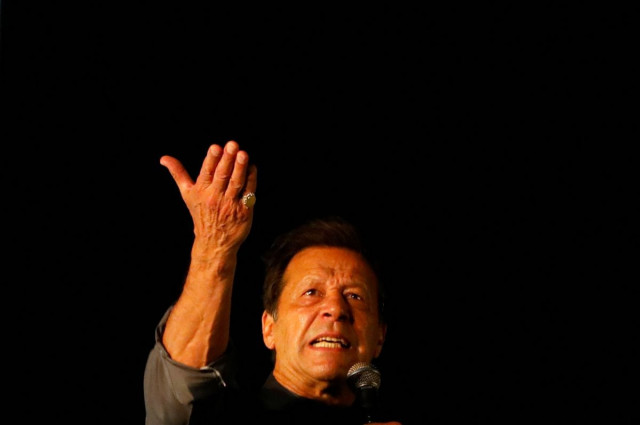Imran summoned for threatening female judge
Sessions judge issues notice to PTI chief to appear before him on Jan 18

A court in Islamabad on Thursday summoned PTI chairman and deposed premier Imran Khan on January 18 for threatening a female judge.
Islamabad Civil and Sessions Senior Judge Rana Mujahid Rahim issued a notice to the PTI chief after police submitted their charge sheet in the case to the court.
The case against the former prime minister was registered on August 20 with Margalla police station in the federal capital over his remarks at a rally in F9 Park where he warned Additional District and Sessions Judge Zeba Chaudhry and police high-ups of dire consequences for what he called their “biased” attitude towards his party.
He alleged that Judge Zeba knew that incarcerated party leader Shahbaz Gill was tortured, but she did not release him on bail.
He threatened to take action against the judge as well as the Islamabad IGP and DIG.
The former premier was booked in a terrorism case on the complaint of Islamabad Saddar Magistrate Ali Javed for threatening the additional sessions judge.
The FIR, lodged with Margalla police station, also carried Section 7 of the Anti-Terrorism Act.
Also read: Imran reaches Zeba’s court to apologise
The FIR was lodged hours before another Islamabad police station received a written complaint from a resident of G-11/2 for lodging a case against the PTI chief over making hate speeches, and inciting rebellion against the army, police and judiciary.
Later, the PTI chief submitted an affidavit to the Islamabad High Court, assuring it that he would never do anything in future that would hurt the dignity of the judiciary, especially the lower one.
Imran added that he was "willing to apologise" to the female judge if she thought he had “crossed a red line”.
The submission of the affidavit by the PTI chief came a day after he appeared before an Islamabad lower court to personally apologise to Judge Zeba, who was not present there at the time.
The court later observed that it was satisfied with the former prime minister’s apology and thus dropping the charges against him.
“Satisfied with Imran Khan’s apology, there is no reason to pursue the contempt of court proceedings further,” the IHC verdict read, adding that the show-cause notice issued against the PTI chief was being withdrawn and he had been discharged from the case.
However, in the detailed judgment, Justice Mohsin Akhtar Kayani disagreed with the paragraph about the “benefit of the doubt” and wrote a note of dissent.
Justice Kayani noted that Imran was not indicted. Therefore, he added that it would be fair to say that he had been “pardoned”.
Justice Babar Sattar wrote an additional note on the same paragraph.
In his opinion, Imran’s speech contained details of judicial and criminal contempt and he had acknowledged the act of delivering a provocative speech.
He observed that the country was in the throes of polarisation with rival political parties finding it hard to employ a discussion and debate within the executive and legislative branches of the State to resolve their disputes in a year leading up to general elections.
“If the judiciary were also denuded of its ability to resolve disputes between the State and citizens or between rival political parties, there would remain no institution capable of issuing declarations of legality within the four corners of the Constitution,” the judge noted.
“In this context, any attempt by a political actor to pressurise and intimidate the judiciary into producing favourable decisions, and bringing the administration of law into disrepute and the judiciary into hatred or ridicule could not be shrugged aside as being of no consequence,” he added.
Justice Sattar wrote that it was under these circumstances that he was discharging the case against the PTI chief under Section 18 instead of “benefit of doubt”.
The IHC quashed the terrorism charges against Imran and the case was transferred from an anti-terrorism court to a sessions one.


1724319076-0/Untitled-design-(5)1724319076-0-208x130.webp)
















COMMENTS
Comments are moderated and generally will be posted if they are on-topic and not abusive.
For more information, please see our Comments FAQ